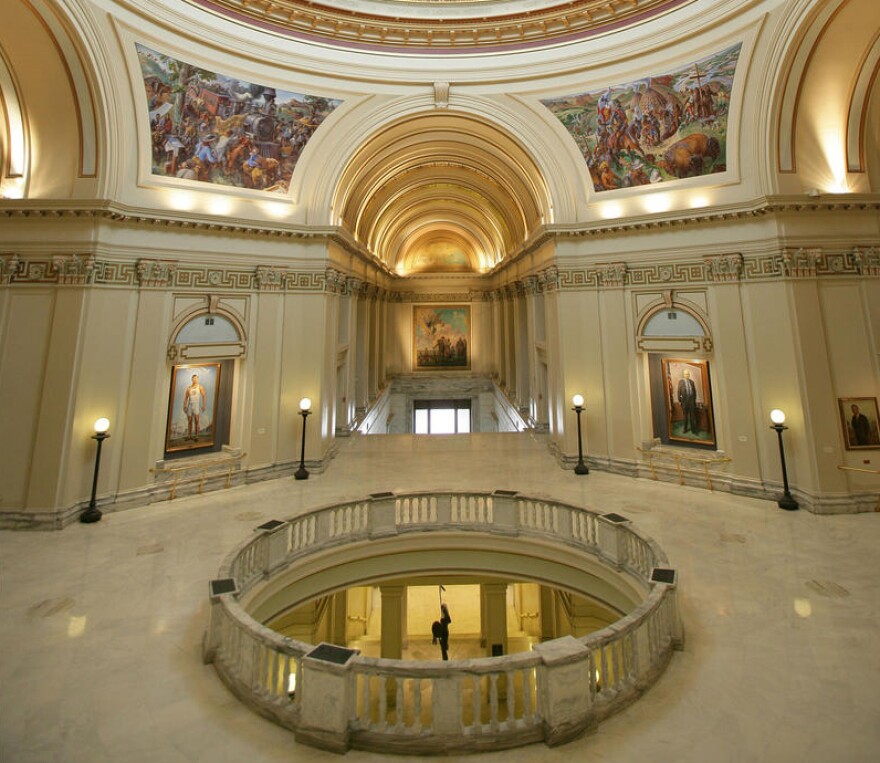Oklahoma lawmakers are still in a special session looking to find additional revenue, one month before the next regular session is scheduled to begin. Gov. Mary Fallin called the special session last month, asking lawmakers to provide additional funding for the Oklahoma Department of Human Services and the State Health Care Authority. The legislature appropriated funds for the health agencies but have not yet found a way to prevent future budget shortfalls.
If nothing else is done to provide additional revenue, the next session will begin on February 5 with a $425 million hole.
eCapitol News Director Shawn Ashley says finding additional revenue will be especially difficult during an election year. Nonetheless, Fallin must find a way to establish a more stable financial footing for the state and begin shaping her legacy in her final year as governor.
Full Transcript
Dick Pryor: This is Capitol Insider, your inside look at Oklahoma politics and policy. I'm Dick Pryor with the eCapitol news director Shawn Ashley. Shawn, as we enter 2018 let's talk about what to expect in the year ahead in Oklahoma. First off, the next part of the second special legislative session has not begun. What's the goal of the special session and what's going on?
Shawn Ashley: Well, it appears conversations are still taking place between legislative leaders of both parties and a group of business leaders who've expressed interest in seeing the state's revenue situation resolved and perhaps proposing some government reforms. The governor and legislative leaders have indicated that the second part of the special session will not occur until they come to a bipartisan agreement that would include both revenue raising measures and some government reform proposals.
Pryor: The regular session begins February 5th. What will be at the top of the agenda, the budget?
Ashley: The budget appears to be the top issue. If no revenue raising measures can be considered during the special session because an agreement is not reached, lawmakers are looking at a rather large budget hole that they're going to have to fill, somewhere in the area of $425 million. If they do come to an agreement that gives them extra money with which to work. And it makes it easier to deal with those budget issues. The other concern arises out of the state Department of Health investigation in the special investigative committee that the House has been running, which has raised questions about how state agencies spend money and that has brought about concerns among legislators. I talked to Representative Josh Cockroft who chairs that committee and asked him if that would impact budget hearings in the coming year and his response was absolutely. It seems lawmakers are going to want more information about what's going on in state agencies.
Pryor: So we can expect that to be a focus in this session?
Ashley: I think it will be a very big focus.
Pryor: The budget hole as you mentioned is expected to be about $425 million. If revenue generation measures are not passed in the special session, how likely is it to happen in the regular session especially given the fact that this is an election year?
Ashley: Well, that has been a driving force behind both special sessions. Governor Mary Fallin has pointed out that it is difficult for lawmakers in an election year to consider, much less pass, revenue raising measures. At the end of the first special session, I asked that question of Senate majority floor leader Gregg Treat, whether being in a regular session essentially undermines efforts to pass revenue raising measures, and he said it's not my position that it is, it's historic. If you look back over time, very few revenue raising measures have even been proposed during a regular session.
Pryor: There have been some improvements marked in the economy. The State Board of Equalization meets on February 18 to certify the actual funds that will be available for appropriation.
Ashley: This is the meeting that gives lawmakers their final number with which to work as they begin writing the budget in conjunction with Governor Mary Fallin. What they'll be looking at are improvements in the economy that have taken place since the December meeting. Keep in mind, in December what we saw was that general revenue fund collections are expected to increase but the overall amount available for appropriation is supposed to decrease because of the use of one time funds.
Pryor: What are other issues to watch this year?
Ashley: I think one of the top issues will be criminal justice reform. Back on July 1, the results of the state questions passed in 2016 were approved and those are beginning to take effect, reducing some felony crimes to misdemeanors. There were some legislative moves that needed to take place that got held up toward the end of the legislative session. I would not be surprised to see those pieces of legislation move forward rather quickly.
Pryor: What makes the 2018 regular session special?
Ashley: It's Governor Mary Fallin is last regular session. A little more than a year ago, she held a press conference where she was announcing some staff changes and she talked about the issue of a governor's legacy. And at this point I think many people would agree that Governor Fallin doesn't have a particular legacy to look back on. So I think you will see her trying to grab hold of that, trying to solidify it in some way. It's her last chance to do so and we'll see what she does.
Pryor: It's shaping up to be another wild year at the Capitol, and we'll be on it. Thanks Shawn.
Ashley: You're very welcome.
Pryor: That's Capitol Insider. If you have questions e-mail us at news@kgou.org or contact us on Twitter @KGOUnews. Until next time with Shawn Ashley, I'm Dick Pryor.







